Communication Skills: Listening, Feedback, and Questioning
VerifiedAdded on 2022/11/14
|5
|1785
|84
Essay
AI Summary
This essay delves into the critical role of communication skills in personal and professional development. It defines communication as the transfer of information between individuals and emphasizes the importance of active listening, feedback, and questioning as key interpersonal skills. The essay explores the benefits of each skill, such as active listening for understanding and empathy, feedback for continuous improvement, and questioning for information gathering and clarification. It highlights the application of these skills in various fields, particularly in an IT company, where effective communication fosters collaboration, avoids misunderstandings, and promotes career growth. The essay concludes by reiterating the essential nature of communication for success in any discipline, underscoring the significance of these skills for building strong relationships and achieving organizational goals. References from various authors are included to support the arguments.
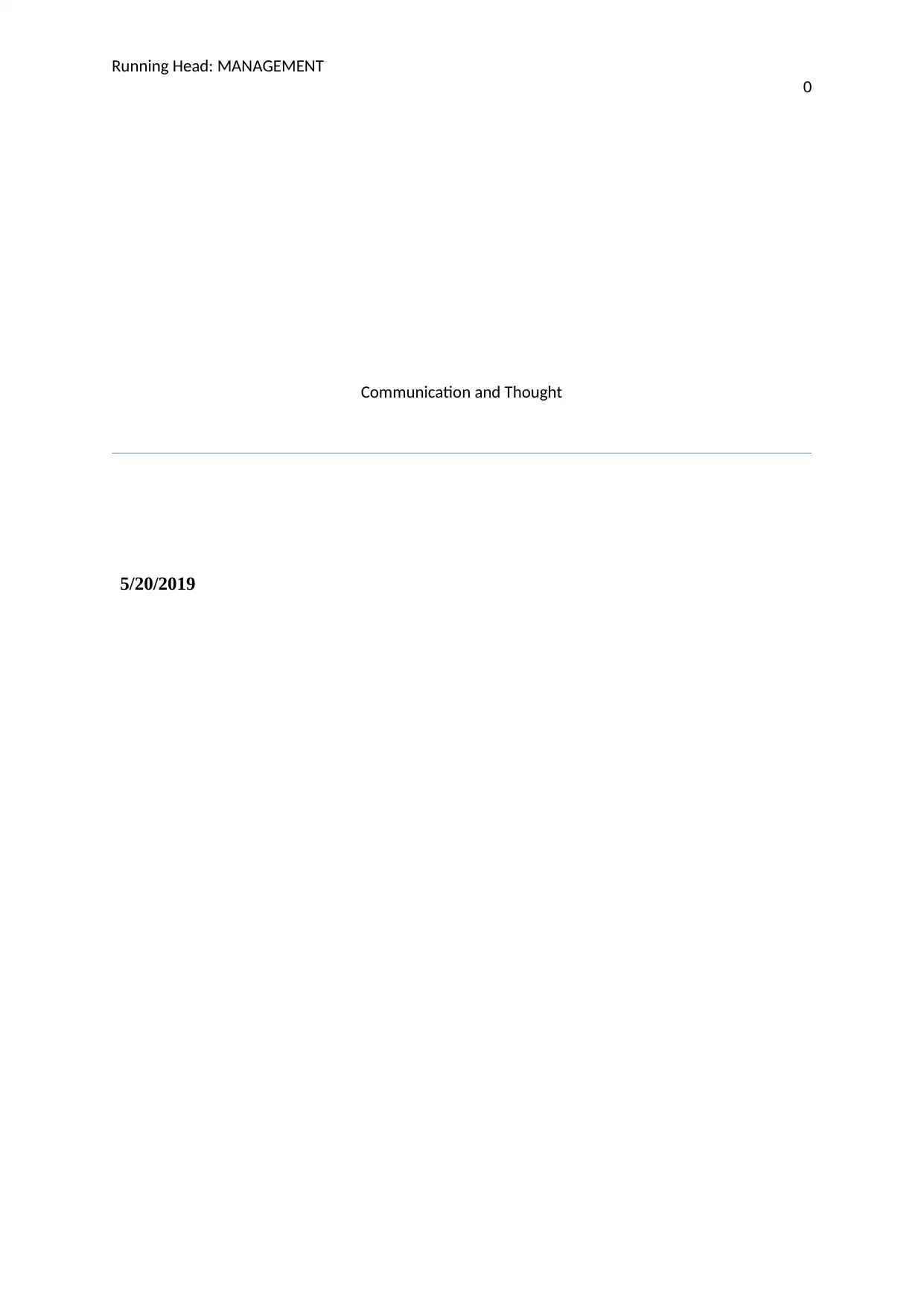
Running Head: MANAGEMENT
0
Communication and Thought
5/20/2019
0
Communication and Thought
5/20/2019
Paraphrase This Document
Need a fresh take? Get an instant paraphrase of this document with our AI Paraphraser
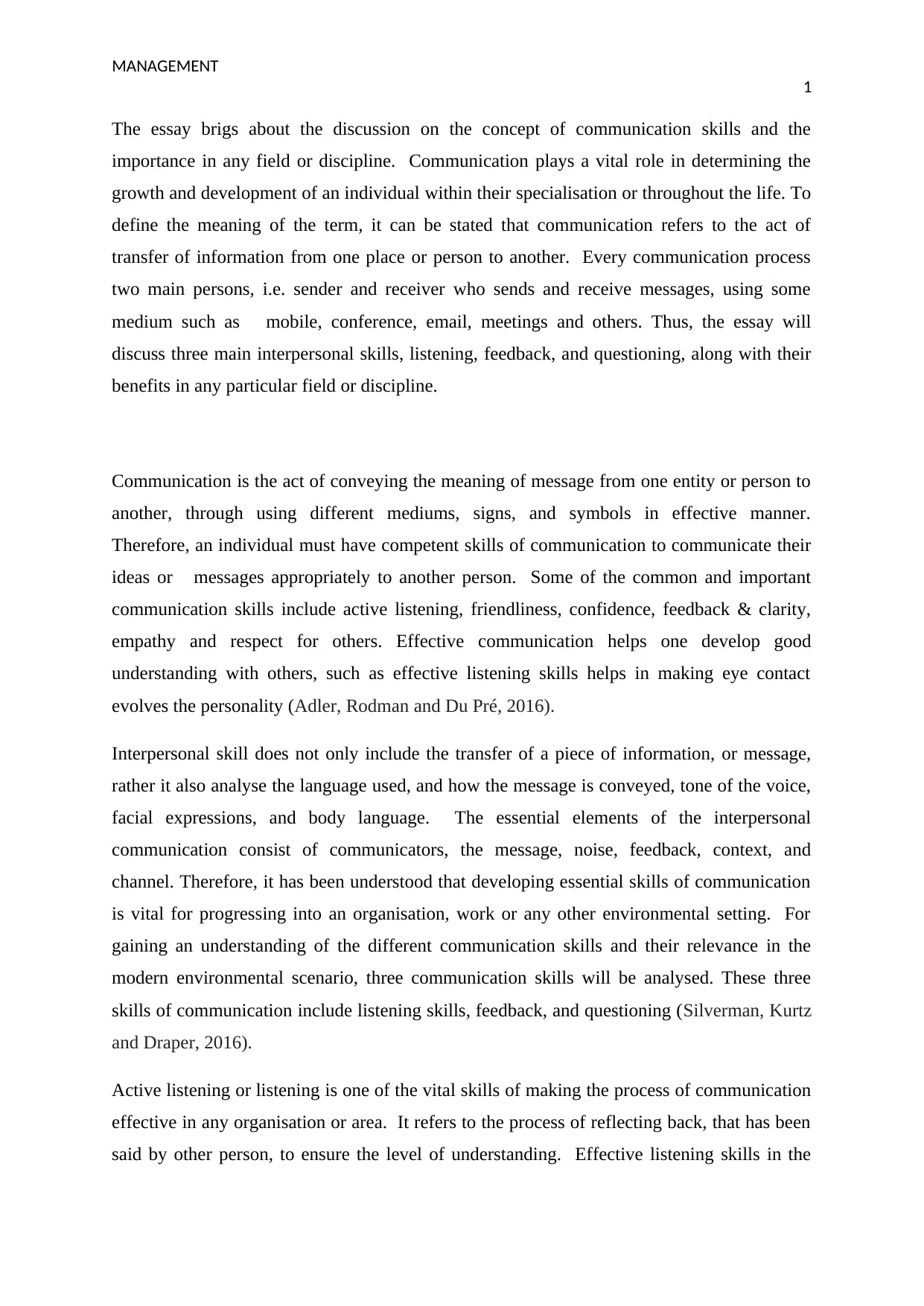
MANAGEMENT
1
The essay brigs about the discussion on the concept of communication skills and the
importance in any field or discipline. Communication plays a vital role in determining the
growth and development of an individual within their specialisation or throughout the life. To
define the meaning of the term, it can be stated that communication refers to the act of
transfer of information from one place or person to another. Every communication process
two main persons, i.e. sender and receiver who sends and receive messages, using some
medium such as mobile, conference, email, meetings and others. Thus, the essay will
discuss three main interpersonal skills, listening, feedback, and questioning, along with their
benefits in any particular field or discipline.
Communication is the act of conveying the meaning of message from one entity or person to
another, through using different mediums, signs, and symbols in effective manner.
Therefore, an individual must have competent skills of communication to communicate their
ideas or messages appropriately to another person. Some of the common and important
communication skills include active listening, friendliness, confidence, feedback & clarity,
empathy and respect for others. Effective communication helps one develop good
understanding with others, such as effective listening skills helps in making eye contact
evolves the personality (Adler, Rodman and Du Pré, 2016).
Interpersonal skill does not only include the transfer of a piece of information, or message,
rather it also analyse the language used, and how the message is conveyed, tone of the voice,
facial expressions, and body language. The essential elements of the interpersonal
communication consist of communicators, the message, noise, feedback, context, and
channel. Therefore, it has been understood that developing essential skills of communication
is vital for progressing into an organisation, work or any other environmental setting. For
gaining an understanding of the different communication skills and their relevance in the
modern environmental scenario, three communication skills will be analysed. These three
skills of communication include listening skills, feedback, and questioning (Silverman, Kurtz
and Draper, 2016).
Active listening or listening is one of the vital skills of making the process of communication
effective in any organisation or area. It refers to the process of reflecting back, that has been
said by other person, to ensure the level of understanding. Effective listening skills in the
1
The essay brigs about the discussion on the concept of communication skills and the
importance in any field or discipline. Communication plays a vital role in determining the
growth and development of an individual within their specialisation or throughout the life. To
define the meaning of the term, it can be stated that communication refers to the act of
transfer of information from one place or person to another. Every communication process
two main persons, i.e. sender and receiver who sends and receive messages, using some
medium such as mobile, conference, email, meetings and others. Thus, the essay will
discuss three main interpersonal skills, listening, feedback, and questioning, along with their
benefits in any particular field or discipline.
Communication is the act of conveying the meaning of message from one entity or person to
another, through using different mediums, signs, and symbols in effective manner.
Therefore, an individual must have competent skills of communication to communicate their
ideas or messages appropriately to another person. Some of the common and important
communication skills include active listening, friendliness, confidence, feedback & clarity,
empathy and respect for others. Effective communication helps one develop good
understanding with others, such as effective listening skills helps in making eye contact
evolves the personality (Adler, Rodman and Du Pré, 2016).
Interpersonal skill does not only include the transfer of a piece of information, or message,
rather it also analyse the language used, and how the message is conveyed, tone of the voice,
facial expressions, and body language. The essential elements of the interpersonal
communication consist of communicators, the message, noise, feedback, context, and
channel. Therefore, it has been understood that developing essential skills of communication
is vital for progressing into an organisation, work or any other environmental setting. For
gaining an understanding of the different communication skills and their relevance in the
modern environmental scenario, three communication skills will be analysed. These three
skills of communication include listening skills, feedback, and questioning (Silverman, Kurtz
and Draper, 2016).
Active listening or listening is one of the vital skills of making the process of communication
effective in any organisation or area. It refers to the process of reflecting back, that has been
said by other person, to ensure the level of understanding. Effective listening skills in the
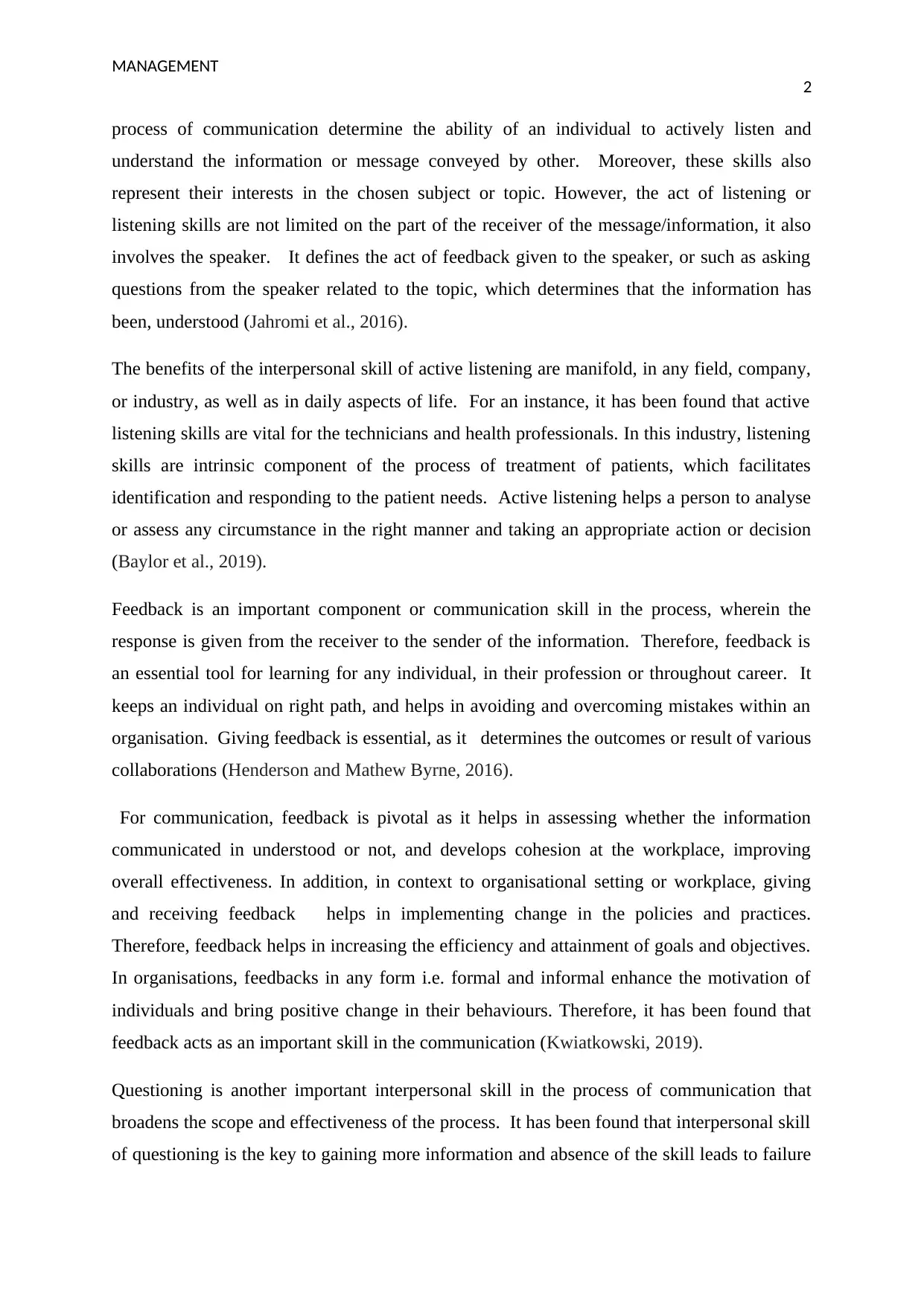
MANAGEMENT
2
process of communication determine the ability of an individual to actively listen and
understand the information or message conveyed by other. Moreover, these skills also
represent their interests in the chosen subject or topic. However, the act of listening or
listening skills are not limited on the part of the receiver of the message/information, it also
involves the speaker. It defines the act of feedback given to the speaker, or such as asking
questions from the speaker related to the topic, which determines that the information has
been, understood (Jahromi et al., 2016).
The benefits of the interpersonal skill of active listening are manifold, in any field, company,
or industry, as well as in daily aspects of life. For an instance, it has been found that active
listening skills are vital for the technicians and health professionals. In this industry, listening
skills are intrinsic component of the process of treatment of patients, which facilitates
identification and responding to the patient needs. Active listening helps a person to analyse
or assess any circumstance in the right manner and taking an appropriate action or decision
(Baylor et al., 2019).
Feedback is an important component or communication skill in the process, wherein the
response is given from the receiver to the sender of the information. Therefore, feedback is
an essential tool for learning for any individual, in their profession or throughout career. It
keeps an individual on right path, and helps in avoiding and overcoming mistakes within an
organisation. Giving feedback is essential, as it determines the outcomes or result of various
collaborations (Henderson and Mathew Byrne, 2016).
For communication, feedback is pivotal as it helps in assessing whether the information
communicated in understood or not, and develops cohesion at the workplace, improving
overall effectiveness. In addition, in context to organisational setting or workplace, giving
and receiving feedback helps in implementing change in the policies and practices.
Therefore, feedback helps in increasing the efficiency and attainment of goals and objectives.
In organisations, feedbacks in any form i.e. formal and informal enhance the motivation of
individuals and bring positive change in their behaviours. Therefore, it has been found that
feedback acts as an important skill in the communication (Kwiatkowski, 2019).
Questioning is another important interpersonal skill in the process of communication that
broadens the scope and effectiveness of the process. It has been found that interpersonal skill
of questioning is the key to gaining more information and absence of the skill leads to failure
2
process of communication determine the ability of an individual to actively listen and
understand the information or message conveyed by other. Moreover, these skills also
represent their interests in the chosen subject or topic. However, the act of listening or
listening skills are not limited on the part of the receiver of the message/information, it also
involves the speaker. It defines the act of feedback given to the speaker, or such as asking
questions from the speaker related to the topic, which determines that the information has
been, understood (Jahromi et al., 2016).
The benefits of the interpersonal skill of active listening are manifold, in any field, company,
or industry, as well as in daily aspects of life. For an instance, it has been found that active
listening skills are vital for the technicians and health professionals. In this industry, listening
skills are intrinsic component of the process of treatment of patients, which facilitates
identification and responding to the patient needs. Active listening helps a person to analyse
or assess any circumstance in the right manner and taking an appropriate action or decision
(Baylor et al., 2019).
Feedback is an important component or communication skill in the process, wherein the
response is given from the receiver to the sender of the information. Therefore, feedback is
an essential tool for learning for any individual, in their profession or throughout career. It
keeps an individual on right path, and helps in avoiding and overcoming mistakes within an
organisation. Giving feedback is essential, as it determines the outcomes or result of various
collaborations (Henderson and Mathew Byrne, 2016).
For communication, feedback is pivotal as it helps in assessing whether the information
communicated in understood or not, and develops cohesion at the workplace, improving
overall effectiveness. In addition, in context to organisational setting or workplace, giving
and receiving feedback helps in implementing change in the policies and practices.
Therefore, feedback helps in increasing the efficiency and attainment of goals and objectives.
In organisations, feedbacks in any form i.e. formal and informal enhance the motivation of
individuals and bring positive change in their behaviours. Therefore, it has been found that
feedback acts as an important skill in the communication (Kwiatkowski, 2019).
Questioning is another important interpersonal skill in the process of communication that
broadens the scope and effectiveness of the process. It has been found that interpersonal skill
of questioning is the key to gaining more information and absence of the skill leads to failure
⊘ This is a preview!⊘
Do you want full access?
Subscribe today to unlock all pages.

Trusted by 1+ million students worldwide
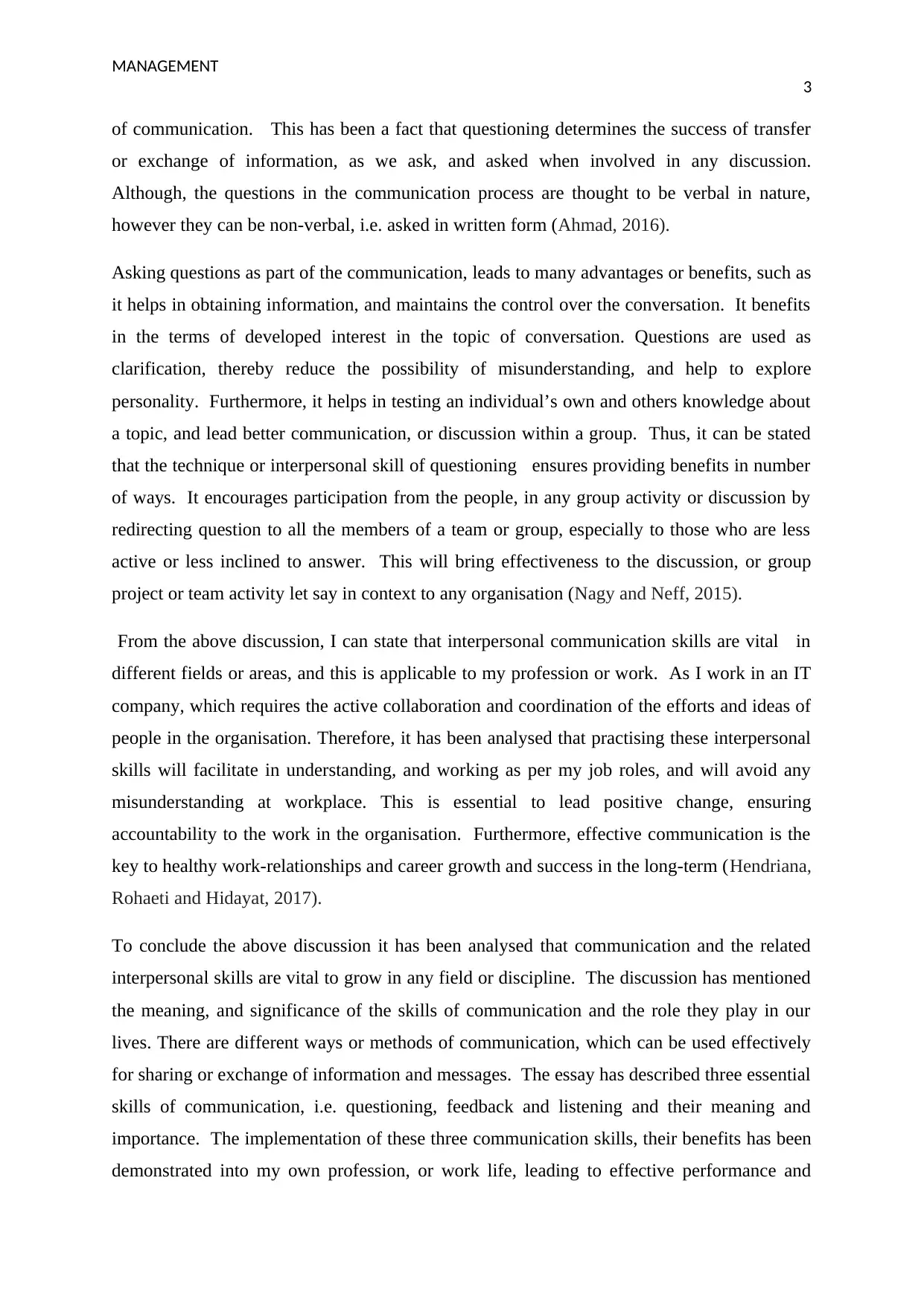
MANAGEMENT
3
of communication. This has been a fact that questioning determines the success of transfer
or exchange of information, as we ask, and asked when involved in any discussion.
Although, the questions in the communication process are thought to be verbal in nature,
however they can be non-verbal, i.e. asked in written form (Ahmad, 2016).
Asking questions as part of the communication, leads to many advantages or benefits, such as
it helps in obtaining information, and maintains the control over the conversation. It benefits
in the terms of developed interest in the topic of conversation. Questions are used as
clarification, thereby reduce the possibility of misunderstanding, and help to explore
personality. Furthermore, it helps in testing an individual’s own and others knowledge about
a topic, and lead better communication, or discussion within a group. Thus, it can be stated
that the technique or interpersonal skill of questioning ensures providing benefits in number
of ways. It encourages participation from the people, in any group activity or discussion by
redirecting question to all the members of a team or group, especially to those who are less
active or less inclined to answer. This will bring effectiveness to the discussion, or group
project or team activity let say in context to any organisation (Nagy and Neff, 2015).
From the above discussion, I can state that interpersonal communication skills are vital in
different fields or areas, and this is applicable to my profession or work. As I work in an IT
company, which requires the active collaboration and coordination of the efforts and ideas of
people in the organisation. Therefore, it has been analysed that practising these interpersonal
skills will facilitate in understanding, and working as per my job roles, and will avoid any
misunderstanding at workplace. This is essential to lead positive change, ensuring
accountability to the work in the organisation. Furthermore, effective communication is the
key to healthy work-relationships and career growth and success in the long-term (Hendriana,
Rohaeti and Hidayat, 2017).
To conclude the above discussion it has been analysed that communication and the related
interpersonal skills are vital to grow in any field or discipline. The discussion has mentioned
the meaning, and significance of the skills of communication and the role they play in our
lives. There are different ways or methods of communication, which can be used effectively
for sharing or exchange of information and messages. The essay has described three essential
skills of communication, i.e. questioning, feedback and listening and their meaning and
importance. The implementation of these three communication skills, their benefits has been
demonstrated into my own profession, or work life, leading to effective performance and
3
of communication. This has been a fact that questioning determines the success of transfer
or exchange of information, as we ask, and asked when involved in any discussion.
Although, the questions in the communication process are thought to be verbal in nature,
however they can be non-verbal, i.e. asked in written form (Ahmad, 2016).
Asking questions as part of the communication, leads to many advantages or benefits, such as
it helps in obtaining information, and maintains the control over the conversation. It benefits
in the terms of developed interest in the topic of conversation. Questions are used as
clarification, thereby reduce the possibility of misunderstanding, and help to explore
personality. Furthermore, it helps in testing an individual’s own and others knowledge about
a topic, and lead better communication, or discussion within a group. Thus, it can be stated
that the technique or interpersonal skill of questioning ensures providing benefits in number
of ways. It encourages participation from the people, in any group activity or discussion by
redirecting question to all the members of a team or group, especially to those who are less
active or less inclined to answer. This will bring effectiveness to the discussion, or group
project or team activity let say in context to any organisation (Nagy and Neff, 2015).
From the above discussion, I can state that interpersonal communication skills are vital in
different fields or areas, and this is applicable to my profession or work. As I work in an IT
company, which requires the active collaboration and coordination of the efforts and ideas of
people in the organisation. Therefore, it has been analysed that practising these interpersonal
skills will facilitate in understanding, and working as per my job roles, and will avoid any
misunderstanding at workplace. This is essential to lead positive change, ensuring
accountability to the work in the organisation. Furthermore, effective communication is the
key to healthy work-relationships and career growth and success in the long-term (Hendriana,
Rohaeti and Hidayat, 2017).
To conclude the above discussion it has been analysed that communication and the related
interpersonal skills are vital to grow in any field or discipline. The discussion has mentioned
the meaning, and significance of the skills of communication and the role they play in our
lives. There are different ways or methods of communication, which can be used effectively
for sharing or exchange of information and messages. The essay has described three essential
skills of communication, i.e. questioning, feedback and listening and their meaning and
importance. The implementation of these three communication skills, their benefits has been
demonstrated into my own profession, or work life, leading to effective performance and
Paraphrase This Document
Need a fresh take? Get an instant paraphrase of this document with our AI Paraphraser
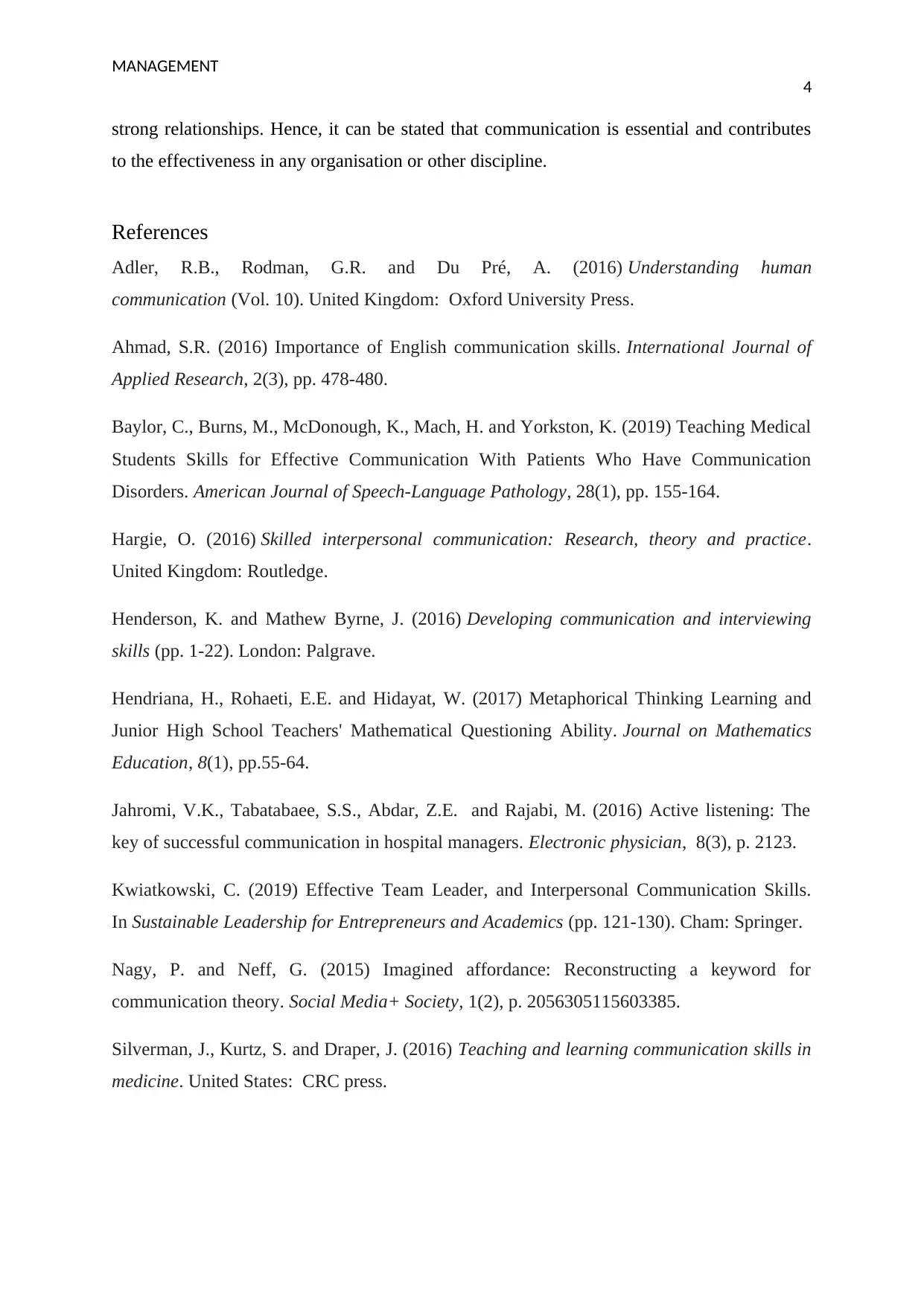
MANAGEMENT
4
strong relationships. Hence, it can be stated that communication is essential and contributes
to the effectiveness in any organisation or other discipline.
References
Adler, R.B., Rodman, G.R. and Du Pré, A. (2016) Understanding human
communication (Vol. 10). United Kingdom: Oxford University Press.
Ahmad, S.R. (2016) Importance of English communication skills. International Journal of
Applied Research, 2(3), pp. 478-480.
Baylor, C., Burns, M., McDonough, K., Mach, H. and Yorkston, K. (2019) Teaching Medical
Students Skills for Effective Communication With Patients Who Have Communication
Disorders. American Journal of Speech-Language Pathology, 28(1), pp. 155-164.
Hargie, O. (2016) Skilled interpersonal communication: Research, theory and practice.
United Kingdom: Routledge.
Henderson, K. and Mathew Byrne, J. (2016) Developing communication and interviewing
skills (pp. 1-22). London: Palgrave.
Hendriana, H., Rohaeti, E.E. and Hidayat, W. (2017) Metaphorical Thinking Learning and
Junior High School Teachers' Mathematical Questioning Ability. Journal on Mathematics
Education, 8(1), pp.55-64.
Jahromi, V.K., Tabatabaee, S.S., Abdar, Z.E. and Rajabi, M. (2016) Active listening: The
key of successful communication in hospital managers. Electronic physician, 8(3), p. 2123.
Kwiatkowski, C. (2019) Effective Team Leader, and Interpersonal Communication Skills.
In Sustainable Leadership for Entrepreneurs and Academics (pp. 121-130). Cham: Springer.
Nagy, P. and Neff, G. (2015) Imagined affordance: Reconstructing a keyword for
communication theory. Social Media+ Society, 1(2), p. 2056305115603385.
Silverman, J., Kurtz, S. and Draper, J. (2016) Teaching and learning communication skills in
medicine. United States: CRC press.
4
strong relationships. Hence, it can be stated that communication is essential and contributes
to the effectiveness in any organisation or other discipline.
References
Adler, R.B., Rodman, G.R. and Du Pré, A. (2016) Understanding human
communication (Vol. 10). United Kingdom: Oxford University Press.
Ahmad, S.R. (2016) Importance of English communication skills. International Journal of
Applied Research, 2(3), pp. 478-480.
Baylor, C., Burns, M., McDonough, K., Mach, H. and Yorkston, K. (2019) Teaching Medical
Students Skills for Effective Communication With Patients Who Have Communication
Disorders. American Journal of Speech-Language Pathology, 28(1), pp. 155-164.
Hargie, O. (2016) Skilled interpersonal communication: Research, theory and practice.
United Kingdom: Routledge.
Henderson, K. and Mathew Byrne, J. (2016) Developing communication and interviewing
skills (pp. 1-22). London: Palgrave.
Hendriana, H., Rohaeti, E.E. and Hidayat, W. (2017) Metaphorical Thinking Learning and
Junior High School Teachers' Mathematical Questioning Ability. Journal on Mathematics
Education, 8(1), pp.55-64.
Jahromi, V.K., Tabatabaee, S.S., Abdar, Z.E. and Rajabi, M. (2016) Active listening: The
key of successful communication in hospital managers. Electronic physician, 8(3), p. 2123.
Kwiatkowski, C. (2019) Effective Team Leader, and Interpersonal Communication Skills.
In Sustainable Leadership for Entrepreneurs and Academics (pp. 121-130). Cham: Springer.
Nagy, P. and Neff, G. (2015) Imagined affordance: Reconstructing a keyword for
communication theory. Social Media+ Society, 1(2), p. 2056305115603385.
Silverman, J., Kurtz, S. and Draper, J. (2016) Teaching and learning communication skills in
medicine. United States: CRC press.
1 out of 5
Related Documents
Your All-in-One AI-Powered Toolkit for Academic Success.
+13062052269
info@desklib.com
Available 24*7 on WhatsApp / Email
![[object Object]](/_next/static/media/star-bottom.7253800d.svg)
Unlock your academic potential
Copyright © 2020–2025 A2Z Services. All Rights Reserved. Developed and managed by ZUCOL.




